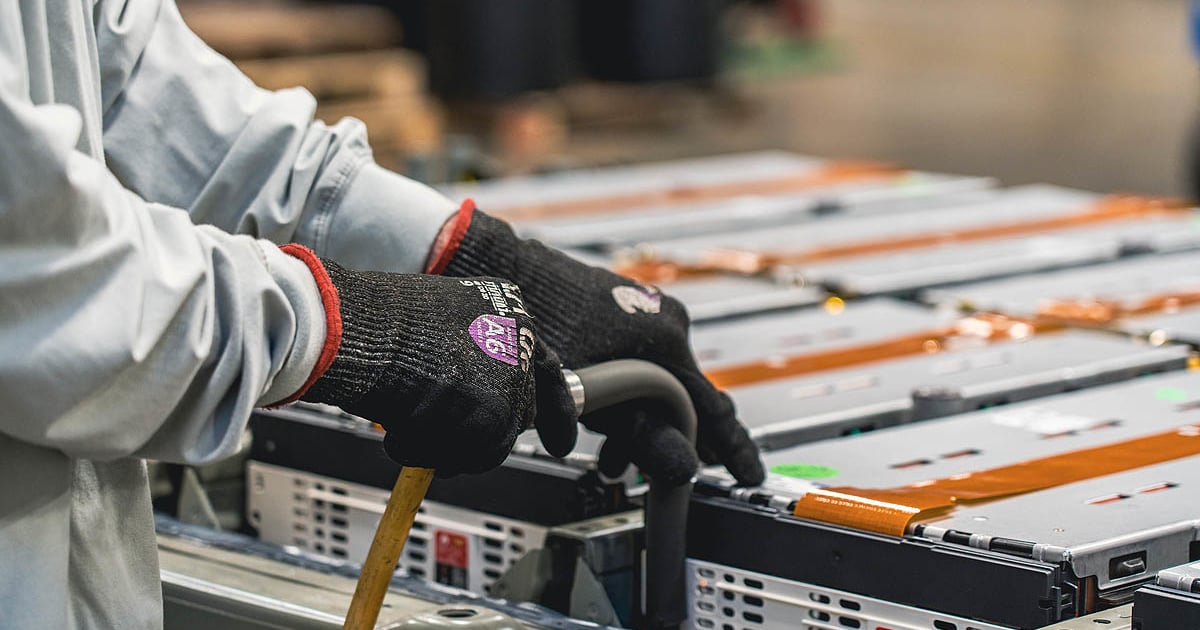
WIXOM, Mich. — Cirba Solutions, a new battery recycler formed from companies with decades of industry experience, plans to expand its electric vehicle battery recycling business sevenfold in the next few years.
The key to Cirba Solutions’ future are its regional facilities.
“The name of the game is to make sure we’ve got locations where we can price materials close to our customers, and also sell that material back close to where the customers are going to be building new batteries for the industry,” said CEO David Klanecky on a tour of the Cirba Solutions plant here.
The company now has six plants, but that will nearly double in the next five years. Cirba has plants in Wixom, Mich., near Detroit; Anaheim, Calif.; Mesa, Ariz.; British Columbia in Canada; and Lancaster and Baltimore in Ohio, both near Columbus. A seventh facility, its flagship, near Columbia, S.C., is slated to open next year.
A small player in the battery recycling sphere, Cirba Solutions is leaning on longstanding relationships with automakers, battery manufacturers, cathode producers and others as it faces competition from prominent battery recycling companies.
Cirba plans to invest more than $1 billion in the battery recycling and materials business in the next decade, Klanecky said. Its employee count — about 300 — is set to double in the next two years.
Regional centers empower the company to offer multiple collection points and to reduce carbon emissions. When Cirba Solutions gets a call to pick up batteries, a representative can travel almost anywhere in the continental U.S. within 48 hours, said Klanecky.
“That’s a massive competitive advantage,” he said. “No one else can do that in the industry.”
The company formed from a series of mergers of three companies: Heritage Battery Recycling, which specialized in battery and materials processing innovation; Retriev Technologies, which specialized in battery materials processing; and Battery Solutions, which specialized in battery collection, logistics and services. Heritage Battery Recycling and Retriev Technologies merged in 2021 and acquired Battery Solutions last year. The combined entity was branded Cirba Solutions in 2022.
Today, Cirba Solutions markets itself as the most comprehensive battery materials and management company for end-of-life batteries and gigafactory scrap.
But analysts say Cirba Solutions will likely face challenges from competitors that have existing partnerships with major automakers.
“There is a place for smaller-scale players in this landscape, but they would have a tough time competing with the likes of Li-Cycle and Redwood Materials,” said Prabhakar Patil, former CEO of LG Chem Power who now advises battery companies.
As EV sales continue to scale, one of Cirba Solutions’ strengths is battery collection in the consumer electronics market, Patil said.
The company uses metals from phones, laptops and even hearing aids to develop materials for batteries, Cirba said.
EVs made up only about 7 percent of the U.S. light-vehicle market in the first quarter of this year, according to Experian, but as the Biden administration and automakers set electrification targets, Cirba Solutions’ input from the auto industry could grow exponentially.
About one-third of batteries that come into recycling plants today are from EVs. In the next few years, Cirba expects the majority of its input to come from the EV industry, which includes batteries and manufacturing scrap. Still, Klanecky said, Cirba will continue to recycle consumer electronics and devices as they have valuable materials that can be repurposed for EV batteries.
The company said it works with every major U.S. automaker on battery and scrap recycling, materials processing and end-of-life battery collection. But the scopes of the partnerships vary. Most automakers want to have multiple recycling partnerships, at various scales, said Danielle Spalding, vice president of marketing for Cirba Solutions.
“We can’t make material fast enough to help support the needs within the marketplace,” Spalding said.
Cirba recycles at least 95 percent of battery materials for use in a new battery, Klanecky said. That level of recycling has become the industry benchmark, two analysts told Automotive News.
“We’re guaranteeing 95 percent, but I think we’re probably closer to the 97 to 98 percent of material gets reused,” Klanecky said.
Cirba Solutions’ automaker contracts can be specific to model lines or certain production sites. The company can recycle batteries from automakers’ R&D teams and even from damaged and defective batteries, Spalding said.
Cirba and Honda, for example, signed a memorandum of understanding last month to collaborate on collecting, processing and returning recycled battery materials for use as raw materials in Honda’s future EVs.
Honda plans to increase its battery-electric and fuel cell sales share to 40 percent globally by 2030, 80 percent by 2035 and 100 percent by 2040, Phil Cozad, North American lithium ion battery recycling leader for Honda Development & Manufacturing America, said in a statement.
Battery recycling is a vital part of achieving such targets, so Honda is collaborating with multiple recycling companies, including Cirba Solutions, “which has strengths in the collection and recovery of battery resources,” Cozad said.
The company also advises automaker partners on recycling-friendly battery assembly. Cirba’s tips? Don’t glue parts together within the battery pack and be consistent with fasteners for a more efficient battery pack breakdown.
“It’s lower cost for them. It’s lower cost for us to be able to recycle that content and give them a better product,” Klanecky said.
Cirba Solutions extracts battery materials through hydrometallurgy, a common practice among battery recyclers.
It produces black mass from the batteries, extracts nickel, cobalt, manganese and lithium and converts the metals into salts by leaching them in acids. Cirba sells the lithium carbonate and nickel, cobalt and manganese sulfate to cathode producers, battery manufacturers, automakers and others.
Though hydrometallurgy is a common recycling method, Spalding said Cirba Solutions and its peers have proprietary processing styles. She declined to elaborate on Cirba Solutions’ process for competitive reasons.
Carly Schaffner contributed to this report.